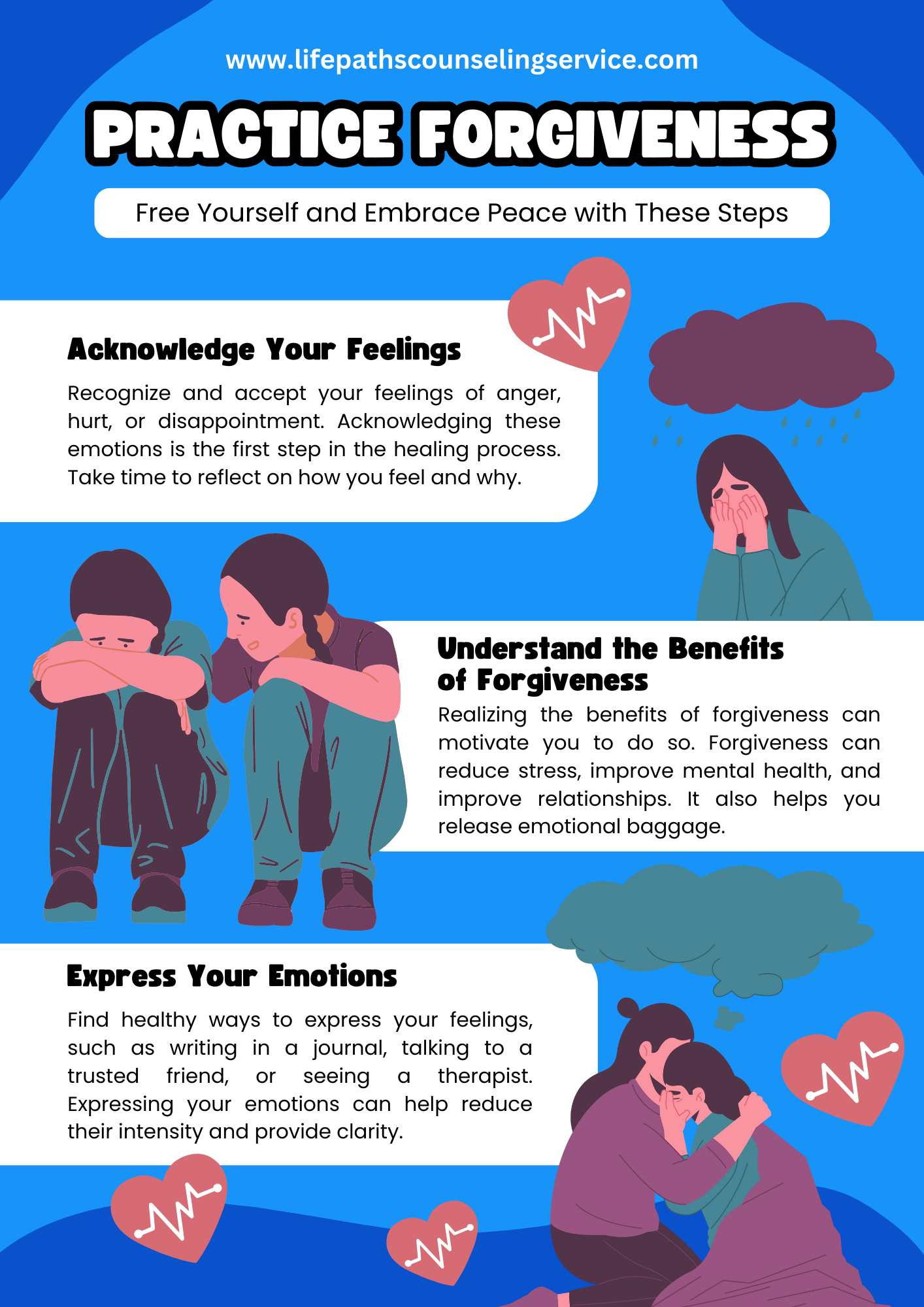The Role of Forgiveness in Healing Relationships
Forgiveness is one of the most powerful tools for healing in any relationship, yet it’s often misunderstood. Many think of forgiveness as excusing harmful behavior or forgetting the past, but true forgiveness is about freeing yourself and your relationship from the weight of resentment, anger, and pain. It’s not an easy process, but it is transformative—and vital for repairing and strengthening relationships.
Let’s explore why forgiveness matters, how it works, and how it can bring healing to even the most broken relationships.
What Forgiveness Is (and What It’s Not)

Forgiveness is often mischaracterized, leading people to resist it or misunderstand its purpose. At its core, forgiveness is the act of letting go of bitterness and anger toward someone who has wronged you. It doesn’t mean condoning bad behavior, forgetting what happened, or avoiding accountability. Instead, forgiveness is a choice to release the emotional hold that a painful event has over you and your relationship.
What forgiveness is not:
- Excusing or justifying harmful actions.
- Minimizing your pain or invalidating your feelings.
- Allowing ongoing harmful behavior without boundaries.
What forgiveness is:
- A decision to let go of resentment and seek peace.
- An act of self-care that prioritizes your emotional well-being.
- A step toward healing and restoring trust in a relationship.
Why Forgiveness is Essential in Relationships
Every relationship, whether with a partner, family member, or friend, will face challenges. Misunderstandings, mistakes, and even betrayals are inevitable because we are all imperfect. When we hold onto anger or grudges, it creates emotional distance and prevents genuine connection. Forgiveness bridges that gap, making room for growth, love, and mutual understanding.
Here’s why forgiveness plays such a crucial role in healing:
- It Reduces Emotional Baggage
Carrying resentment is emotionally exhausting. Forgiveness allows you to release this weight, giving you and the relationship space to heal. - It Restores Connection
Unforgiveness creates barriers that prevent intimacy and trust. When we forgive, we open the door to deeper connection and understanding. - It Promotes Personal Growth
Forgiveness is a transformative process that helps you develop empathy, patience, and emotional resilience. - It Builds Trust Over Time
While forgiveness alone doesn’t rebuild trust, it’s a critical step in the process. By forgiving, you create an opportunity for trust to be restored through consistent actions and accountability. - It Reflects Grace and Compassion
In faith-based contexts, forgiveness is often seen as an act of grace—extending the same compassion we hope to receive from others and from God.
The Process of Forgiveness
Forgiveness is not a single moment; it’s a journey that requires intentional effort. Here are the key steps to practicing forgiveness in relationships:
- Acknowledge the Pain
Before you can forgive, it’s essential to recognize the hurt and how it has affected you. Ignoring or suppressing your feelings won’t lead to genuine forgiveness. - Understand the Other Person’s Perspective
While you don’t have to agree with or excuse their actions, seeking to understand the reasons behind their behavior can foster empathy. - Communicate Honestly
Express your feelings to the person who hurt you, if it’s safe and appropriate. Sharing how their actions impacted you can be a powerful step toward reconciliation. - Set Boundaries
Forgiveness doesn’t mean tolerating repeated harm. Setting clear boundaries protects your emotional well-being and helps rebuild trust. - Let Go of Resentment
Forgiveness is ultimately about letting go of the anger and bitterness that keep you tied to the hurt. This may take time, but it’s essential for moving forward. - Rebuild Trust Gradually
If the relationship is to be restored, trust must be rebuilt through consistent, trustworthy actions over time. Forgiveness lays the groundwork for this process.
Faith and Forgiveness: A Christian Perspective
For those who approach forgiveness from a Christian perspective, it is often seen as a reflection of God’s grace. The Bible teaches us to forgive as we have been forgiven (Ephesians 4:32), emphasizing that forgiveness is both a gift we receive and a gift we give.
When we forgive, we are imitating Christ’s love and demonstrating faith in the power of grace to heal and restore. This doesn’t mean ignoring justice or accountability, but rather trusting that forgiveness is part of God’s plan for healing broken relationships.
The Healing Power of Forgiveness
Forgiveness is not about erasing the past; it’s about creating a healthier future. It allows us to release the burden of anger, rebuild broken bonds, and foster deeper, more meaningful connections. While the journey may be difficult, the result is freedom—freedom from pain, resentment, and the barriers that hold us back from true healing.
If you’re struggling to forgive someone in your life, consider seeking the support of a therapist. Therapy provides a safe and compassionate space to work through the hurt, understand your emotions, and move toward forgiveness in a way that feels authentic to you.
Are you ready to explore the healing power of forgiveness? Contact us today to take the first step toward peace and restoration in your relationships.